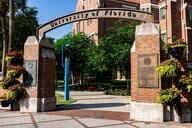You have /5 articles left.
Sign up for a free account or log in.
In October 1963, James Baldwin delivered his now-famous “Talk to Teachers” before a group of educators in New York. “Let’s begin,” he said, “by saying we are living through a very dangerous time.” That was, if anything, an understatement. A month earlier, Ku Klux Klan arsonists bombed a church in Birmingham, Ala., murdering four African American girls. And a month after Baldwin’s talk, President John F. Kennedy was gunned down in Dallas.
Baldwin went on to demand an honest account of history in our classrooms, especially about the ways that slavery and racism discolored the lives of blacks and whites alike. But he also cautioned against indoctrinating students, about anything. “The purpose of education, finally, is to create in a person the ability to look at the world for himself, to make his own decisions, to say to himself this is black or this is white, to decide for himself whether there is a God in heaven or not,” Baldwin declared. “To ask questions of the universe, and then learn to live with those questions, is the way he achieves his own identity.”
I’ve been thinking about Baldwin’s charge as more colleges announce plans to reopen in the fall. Surely, in the wake of the George Floyd police murder and subsequent protests, we have a duty to explore the complex and violent history of the United States with our students. Yet we must also avoid imposing a singular interpretation or ideology that will prevent -- not promote -- a true and honest education around race.
Letters to the Editor
A reader has submitted a response
to this essay. You can view it here
and find all of our Letters
to the Editor here.
Witness the proliferation of “reading lists” pinging around the internet, all designed to teach people -- especially white people -- about racism. As a historian, I’m elated that so many Americans are devouring recent books by Ibram Kendi, Ijeoma Oluo and Ta-Nehisi Coates, as well as classics such as The Autobiography of Malcolm X and Baldwin’s own The Fire Next Time. And I’d be delighted to see any of these books on college syllabi in September.
But I would also want them to be combined with works by other African American authors like John McWhorter and Thomas Chatterton Williams, who take a different stance. Acknowledging the awful history that Baldwin described, they nevertheless question the idea that racism is both the defining and the delimiting feature of the contemporary United States.
Indeed, McWhorter and Williams argue, that claim does a dangerous disservice to African Americans and to the larger cause of racial justice and equality. It teaches us that every human difference is a product of discrimination, which discourages minorities from the kinds of behaviors that would improve their lot. If the game is fundamentally rigged, why play at all? You know you can’t win, so you shouldn’t even try.
It also encourages another kind of cultural contest, the “all-American skin game,” which “demands you select a box and define yourself by it,” as Williams writes. We are more than the racial categories that our hateful history has bequeathed to us. And in the best society, which is a very long way off, we would all be free to identify ourselves in whatever manner we choose.
I’m not saying McWhorter and Williams are right (or wrong, for that matter). But surely, they represent a legitimate intellectual challenge to the “antiracist” framework proposed by Kendi, who insists that racism “has spread to nearly every part of the body politic.” To state the obvious, McWhorter and Williams are opposed to racism, as well. But they’ve suggested that Kendi's approach will probably not get us closer to overcoming racism -- and might even reinforce it.
And surely our past encounters with race are subject to multiple interpretations, too. We saw that in the controversy over The New York Times’ Pulitzer Prize-winning “1619 Project,” which highlighted how slavery and racism have affected everything from housing and labor to health and education. It also triggered stark objections from several leading historians, who said the project distorted or downplayed the role of Americans -- of every race -- in resisting racism and creating a more perfect (albeit still imperfect) union.
Like McWhorter and Williams, these scholars did not shrink from identifying slavery, segregation and racism as key factors in shaping America. But they rejected the idea that racism “runs in the very DNA of this country” -- as the project’s lead author, Nikole Hannah-Jones, wrote -- and the implication that it limited what Americans could imagine or accomplish. “The function of these tropes is to deny change over time,” historian James Oakes told an interviewer, criticizing “The 1619 Project.” “The worst thing about it is that it leads to political paralysis … If it’s the DNA, there’s nothing you can do. What do you do? Alter your DNA?”
Oakes’s interview ran on a socialist website, which should tell you something. “The 1619 Project” became a punching bag for red-meat conservatives like Newt Gingrich, who flatly called it a “lie” perpetuated by hidebound leftist elites. But it also drew fire from staunchly liberal scholars like Oakes, who applauded the Times for exploring racial histories but disputed its interpretation of them. Again, Oakes might be wrong, or right, or any number of shades in between. But surely any teacher using “The 1619 Project” in class -- as many have already begun to do -- owes it to students to present contrasting perspectives on it.
Don’t hold your breath for that. Despite all of the rhetoric about “hard work” and “courageous conversations,” we seem to be gearing up for a spate of single-minded indoctrination around race. I find Kendi’s own recommended reading list -- which the Times published earlier this spring -- a case in point, as it pretty much studiously avoids any author whose assumptions break fundamentally from his. Introducing the list, Kendi wrote that “we need to read books that are difficult or unorthodox, that don’t go down easily.” But a truly difficult approach would require us to grapple with different ideas about race, instead of inscribing a new orthodoxy about it.
It would also pay homage to the great James Baldwin, who knew just how hard all of this would be. Pleading for an education that taught students to “examine everything” -- and to come to their own conclusions -- Baldwin admitted that “no society is really anxious to have that kind of person around.”
Yet it remains our basic duty, as teachers, to cultivate precisely the type of person that Baldwin had in mind. Presenting a single story about race -- and pretending it's a holy writ -- won’t make students more aware or informed; it will instead make them into cynics who mouth the right incantations when we say the word. Our job is to teach them to ask questions of the universe, not to answer the questions ourselves. Let’s see if we can summon the courage to do it, even in our own very dangerous time.



